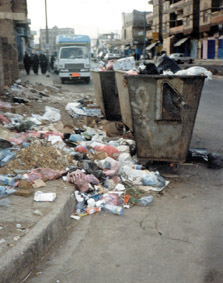
Failure of Men and the System Leads to an All-Women Initiative: Cleaning Sanaa City as a Priority Action [Archives:1999/10/Front Page]
March 8 1999

The group plans many activities, such as city-cleaning, as well as discussions on respect for children’s rights, population issues, violence against women, the disastrous effects of qat, and increasing rights awareness among women, etc. Committees were set up to address those and other issues.
“The top priority, however, is to help control the garbage situation in our city, Sanaa. We decided that cleaning up Sanaa was a priority,” Ibtisam said. Towards that end, the main actions taken so far include the following:
1) Visiting girl’s schools to explain how the spread garbage is a health hazard, an environmental problem, and an eyesore, and what they can do.

3) Visiting families in neighborhoods where garbage seems to be mishandled, to explain what the families can do to help address the problem.
4) Contacting mosque preachers and asking them to include in their sermons advice about hygiene, cleanliness, and how to contribute to a better physical environment.
5) Coordinating with municipal authorities to more regularly collect garbage and assign fixed dumping grounds far from residential areas.
6) Starting actual work on one quarter – Asbahi area, which will be used as a model.
7) Working with local community elders at all stages.
The group also plans to undertake many other initiatives. These include visiting hospitals to help improve health services, visiting prisons in order to make sure the minimum humanly-acceptable treatment is given to all, especially to the women, printing pamphlets about political rights for all, etc.
Some men are amused by the initiatives, but are scared that the women could in fact succeed.
By: Ahlam Al Mutawakkil,
Yemen Times, Sanaa.
——
[archive-e:10-v:1999-y:1999-d:1999-03-08-p:./1999/iss10/front.htm]


